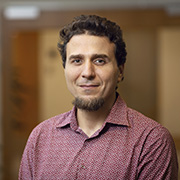AIAS Fellows' Seminar: Bogdan C. Iacob
An Alternative Europe? Global Spaces and Balkan Imaginations during the Cold War”
Info about event
Time
Location
Online via Zoom

Due to the corona crisis and the physical lockdown of the university and the physical distancing, the seminar will be held online, via Zoom:
https://aarhusuniversity.zoom.us/j/893013987
Abstract
The lecture will connect political and cultural discourses from the Balkans and about the Balkans, starting with the 1960s, to transformations in global hierarchies. It will discuss regional entanglements with decolonization, international organizations (UNESCO and its affiliated humanities-focused non-governmental organizations), and non-Western representations of the world and its civilizations. I will map the rise and fall of the Southeast as alternative symbolic geography: taking advantage of Cold War globalization, Balkan elites challenged Western and Soviet hegemony over the imagination of Europe.
Short bio
Bogdan obtained a PhD from Central European University (2011) and worked at academic institutions in Europe and the United States. He is affiliated with the Institute of History (Romanian Academy). His main scholarly interest is the study of expert knowledge in transnational and transregional frameworks. He is researching Balkan intellectuals’ and politicians’ narratives, policies, and international entanglements that configured Southeast Europe as alternative symbolic geography during the Cold War. He has also published on Eastern European contributions to global health politics, re-visiting the history and aftermath of ‘1989’ as well as transitional justice.
See Bogdan C. Iacob's project at AIAS
What is a Fellows' Seminar?
The AIAS Fellows' Seminar is a session of seminars held by the AIAS fellow or by other speakers proposed by the fellows. In each seminar, one fellow will present and discuss his/her current research and research project, closing off with a question and discussion session.
All seminars are held in English and open to the public. Registration to the seminar is not necessary.
